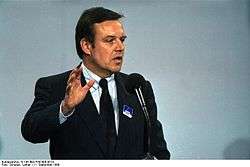Volker Rühe
| Volker Rühe | |
|---|---|
 | |
| German Federal Minister of Defence | |
|
In office 1 April 1992 – 26 October 1998 | |
| Chancellor | Helmut Kohl |
| Preceded by | Gerhard Stoltenberg |
| Succeeded by | Rudolf Scharping |
| Member of the German Bundestag | |
|
In office 14 December 1976 – 18 October 2005 | |
| Personal details | |
| Born |
25 September 1942 Hamburg, Germany |
| Political party | Christian Democratic Union (1963–present) |
| Alma mater | University of Hamburg |
| Occupation | Teacher |
Volker Rühe (born September 25, 1942) is a German politician affiliated to the CDU. He served as German Defence minister from April 1, 1992, succeeding Gerhard Stoltenberg during the first government of a reunified Germany in the fourth cabinet of Chancellor Kohl, to the end of the fifth Kohl Cabinet on October 27, 1998. During his time at the Defence Ministry Rühe played a central role in placing NATO enlargement on the German political agenda.[1] He unsuccessfully ran for the office of minister-president of the German state Schleswig-Holstein in the year 2000.
From 1976 to 2005 he was a member of the German Bundestag. Volker Rühe is currently resigned from active participation in electoral politics. He was recently quoted by Neue Presse expressing sympathy for Russian President Vladimir Putin and arguing for an intensive dialogue between the German government and "the Kremlin" on the subject of the American proposed "missile defense system". "We are talking as if Iran already had nuclear weapons... we can't continue with deterrence, like during the Cold War."
References
| Wikimedia Commons has media related to Volker Rühe. |
| Political offices | ||
|---|---|---|
| Preceded by Gerhard Stoltenberg |
Federal Minister of Defence (Germany) 1992 – 1998 |
Succeeded by Rudolf Scharping |